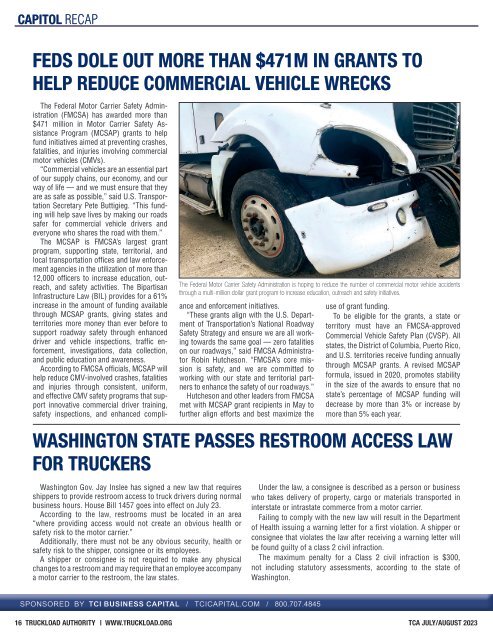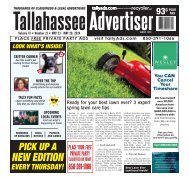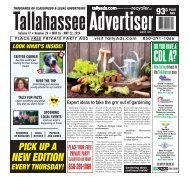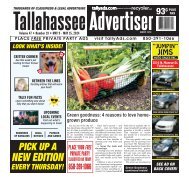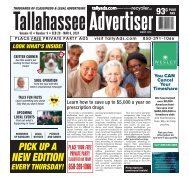TLA61_AllPages
You also want an ePaper? Increase the reach of your titles
YUMPU automatically turns print PDFs into web optimized ePapers that Google loves.
CAPITOL recap<br />
Feds dole out more than $471M in grants to<br />
help reduce commercial vehicle wrecks<br />
The Federal Motor Carrier Safety Administration is hoping to reduce the number of commercial motor vehicle accidents<br />
through a multi-million dollar grant program to increase education, outreach and safety initiatives.<br />
The Federal Motor Carrier Safety Administration<br />
(FMCSA) has awarded more than<br />
$471 million in Motor Carrier Safety Assistance<br />
Program (MCSAP) grants to help<br />
fund initiatives aimed at preventing crashes,<br />
fatalities, and injuries involving commercial<br />
motor vehicles (CMVs).<br />
“Commercial vehicles are an essential part<br />
of our supply chains, our economy, and our<br />
way of life — and we must ensure that they<br />
are as safe as possible,” said U.S. Transportation<br />
Secretary Pete Buttigieg. “This funding<br />
will help save lives by making our roads<br />
safer for commercial vehicle drivers and<br />
everyone who shares the road with them.”<br />
The MCSAP is FMCSA’s largest grant<br />
program, supporting state, territorial, and<br />
local transportation offices and law enforcement<br />
agencies in the utilization of more than<br />
12,000 officers to increase education, outreach,<br />
and safety activities. The Bipartisan<br />
Infrastructure Law (BIL) provides for a 61%<br />
increase in the amount of funding available<br />
through MCSAP grants, giving states and<br />
territories more money than ever before to<br />
support roadway safety through enhanced<br />
driver and vehicle inspections, traffic enforcement,<br />
investigations, data collection,<br />
and public education and awareness.<br />
According to FMCSA officials, MCSAP will<br />
help reduce CMV-involved crashes, fatalities<br />
and injuries through consistent, uniform,<br />
and effective CMV safety programs that support<br />
innovative commercial driver training,<br />
safety inspections, and enhanced compliance<br />
and enforcement initiatives.<br />
“These grants align with the U.S. Department<br />
of Transportation’s National Roadway<br />
Safety Strategy and ensure we are all working<br />
towards the same goal — zero fatalities<br />
on our roadways,” said FMCSA Administrator<br />
Robin Hutcheson. “FMCSA’s core mission<br />
is safety, and we are committed to<br />
working with our state and territorial partners<br />
to enhance the safety of our roadways.”<br />
Hutcheson and other leaders from FMCSA<br />
met with MCSAP grant recipients in May to<br />
further align efforts and best maximize the<br />
use of grant funding.<br />
To be eligible for the grants, a state or<br />
territory must have an FMCSA-approved<br />
Commercial Vehicle Safety Plan (CVSP). All<br />
states, the District of Columbia, Puerto Rico,<br />
and U.S. territories receive funding annually<br />
through MCSAP grants. A revised MCSAP<br />
formula, issued in 2020, promotes stability<br />
in the size of the awards to ensure that no<br />
state’s percentage of MCSAP funding will<br />
decrease by more than 3% or increase by<br />
more than 5% each year.<br />
Washington state passes restroom access law<br />
for truckers<br />
Washington Gov. Jay Inslee has signed a new law that requires<br />
shippers to provide restroom access to truck drivers during normal<br />
business hours. House Bill 1457 goes into effect on July 23.<br />
According to the law, restrooms must be located in an area<br />
“where providing access would not create an obvious health or<br />
safety risk to the motor carrier.”<br />
Additionally, there must not be any obvious security, health or<br />
safety risk to the shipper, consignee or its employees.<br />
A shipper or consignee is not required to make any physical<br />
changes to a restroom and may require that an employee accompany<br />
a motor carrier to the restroom, the law states.<br />
Under the law, a consignee is described as a person or business<br />
who takes delivery of property, cargo or materials transported in<br />
interstate or intrastate commerce from a motor carrier.<br />
Failing to comply with the new law will result in the Department<br />
of Health issuing a warning letter for a first violation. A shipper or<br />
consignee that violates the law after receiving a warning letter will<br />
be found guilty of a class 2 civil infraction.<br />
The maximum penalty for a Class 2 civil infraction is $300,<br />
not including statutory assessments, according to the state of<br />
Washington.<br />
Sponsored by TCI Business Capital / TCICapital.com / 800.707.4845<br />
16 Truckload Authority | www.Truckload.org TCA JULY/AUGUST 2023


